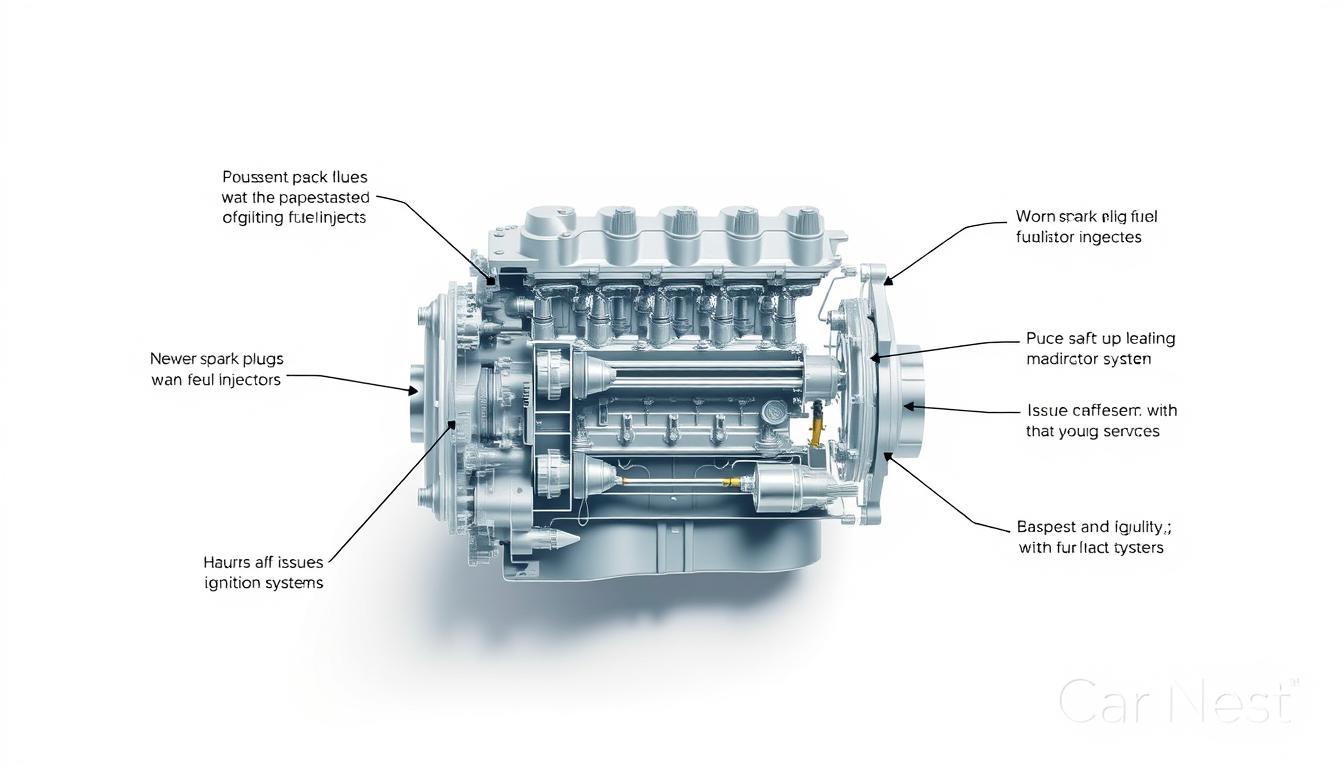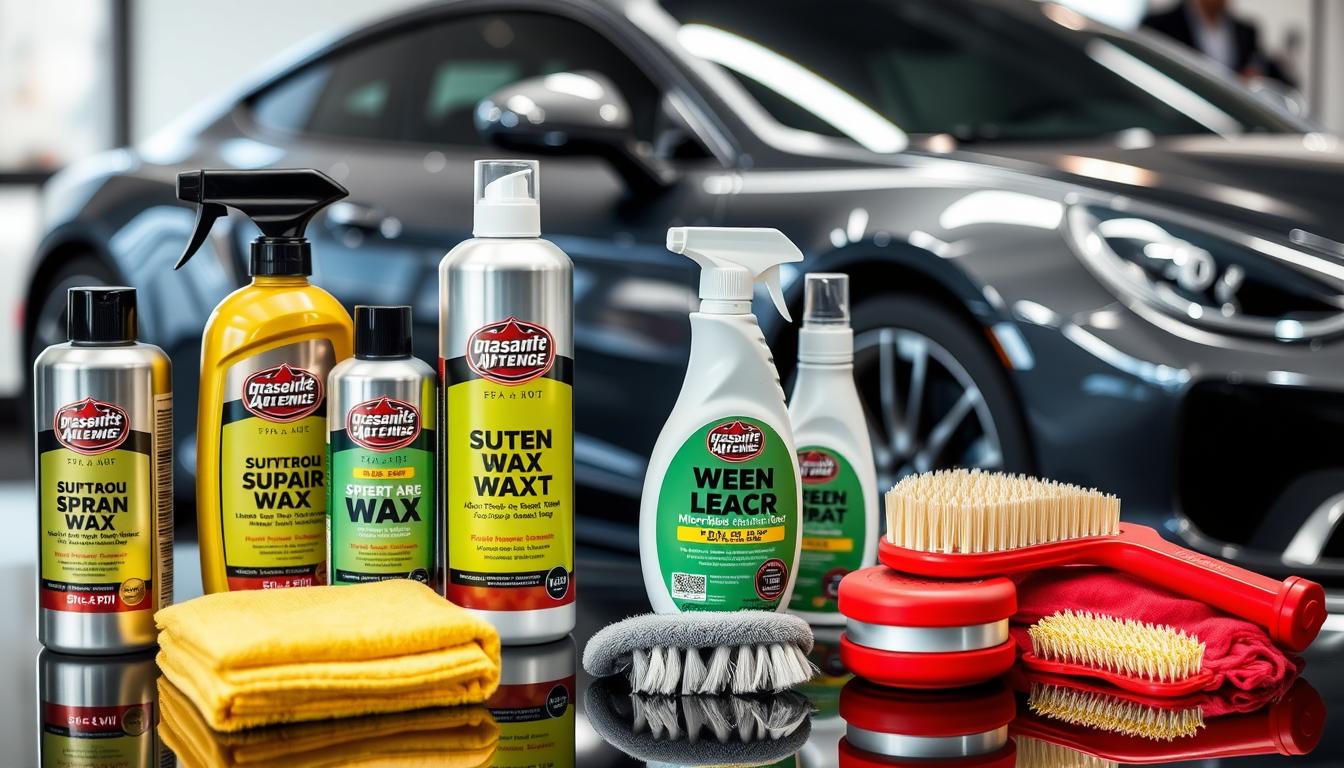A misfiring engine can be a frustrating and potentially costly issue for car owners. Did you know that a blockage of just 8% to 10% in a fuel injector can cause a misfire, leading to symptoms like an irregular idle or loss of power? Engine misfires can manifest in various ways, from subtle performance issues to more dramatic symptoms that can leave you stranded.
Understanding the signs of engine misfires is crucial for proper diagnosis and timely repairs. Modern vehicles often display specific warning signs when misfires occur, such as the illumination of the check engine light. By identifying the root cause of the problem, you can take corrective action to prevent further damage and costly repairs down the line.
Key Takeaways
- Engine misfires can be caused by a variety of factors, including faulty fuel injectors and ignition coils.
- Modern vehicles often display specific warning signs when misfires occur.
- Understanding the signs of engine misfires is crucial for proper diagnosis and timely repairs.
- A misfiring engine can lead to costly repairs if left unaddressed.
- Early diagnosis and repair can save time and money in the long run.
Understanding Engine Misfires and Their Impact
An engine misfire occurs when the combustion process in one or more cylinders fails, disrupting the engine’s normal operation. To understand this, it’s essential to know how a car engine works. A typical engine operates on a four-stroke cycle: intake, compression, combustion, and exhaust.
What Exactly Is an Engine Misfire?
A misfire happens when one or more stages of the four-stroke cycle are incorrect or missing. This could be due to a variety of reasons such as a rich or thin air-fuel mixture, bad ignition spark, low compression, or improper timing. When this occurs, the engine’s performance is compromised.
Why Addressing Misfires Promptly Matters
Ignoring engine misfires can lead to severe consequences, including catalytic converter damage, increased emissions, and potentially catastrophic engine failure. Modern engine management systems detect misfires and adjust operation to minimize damage, often triggering warning lights. Prompt diagnosis and repair are crucial to prevent more expensive repairs down the road.
| Cause of Misfire | Effect on Engine | Potential Damage |
|---|---|---|
| Rich or Thin Air-Fuel Mixture | Disrupts Combustion Process | Catalytic Converter Damage |
| Bad Ignition Spark | Prevents Proper Combustion | Increased Emissions |
| Low Compression | Reduces Engine Efficiency | Engine Failure |
Recognizing the Signs of Engine Misfires
When your engine misfires, it can manifest in several ways, making it crucial to recognize the signs. Engine misfires can lead to decreased performance, reduced fuel efficiency, and potentially cause damage to your engine if left unaddressed.
Rough Acceleration and Idle
Rough acceleration is one of the most noticeable signs of engine misfiring, often felt as jerking, hesitation, or stumbling when pressing the gas pedal. Engine misfires can also cause rough idling, where the RPM fluctuates unpredictably or the engine feels like it might stall when stationary.
Check Engine Light Warnings
The check engine light is a critical indicator of engine misfires. A steady light may indicate an intermittent misfire, while a blinking light suggests a severe, ongoing misfire that requires immediate attention.
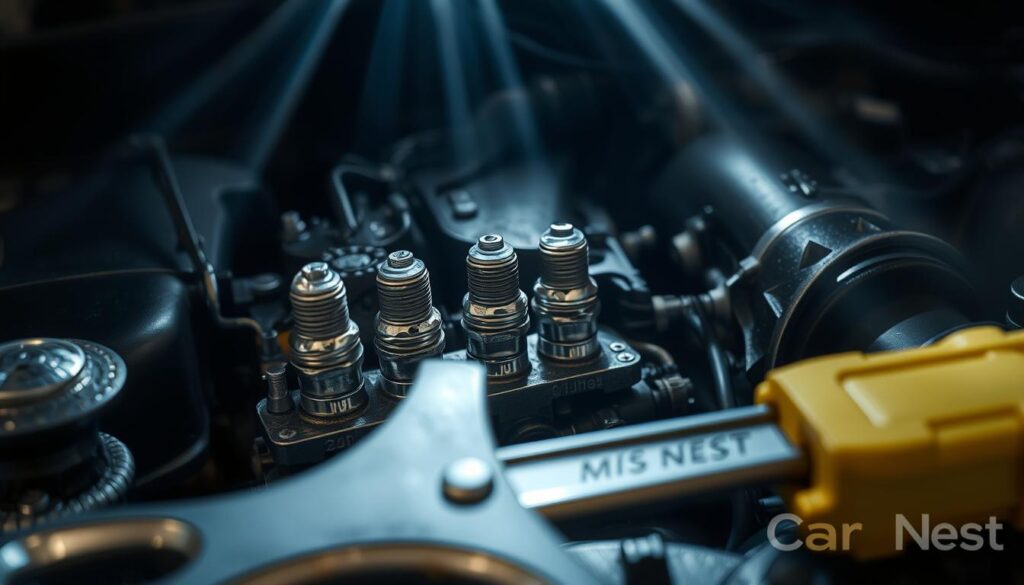
Unusual Vibrations and Sounds
Unusual vibrations are common with misfires because the engine becomes unbalanced when one or more cylinders aren’t firing properly. This can lead to noticeable shaking, especially when accelerating or idling.
Performance Issues
Performance issues such as reduced power, hesitation during acceleration, and poor fuel economy are direct consequences of engine misfiring. These symptoms can be particularly noticeable during specific driving conditions.
| Signs | Description |
|---|---|
| Rough Acceleration | Jerking or hesitation when pressing the gas pedal |
| Check Engine Light | Steady or blinking light indicating misfire severity |
| Unusual Vibrations | Noticeable shaking due to engine imbalance |
| Performance Issues | Reduced power, hesitation, and poor fuel economy |
Top 10 Reasons for Engine Misfires
The top 10 reasons for engine misfires encompass a range of potential causes, from simple to complex issues. Understanding these causes is crucial for effective repair and maintaining your vehicle’s performance.
1. Worn or Fouled Spark Plugs
Worn or fouled spark plugs are among the most common causes of engine misfires. These small but crucial components deliver the spark that ignites the fuel in your engine. If they’re not working properly, your engine won’t be firing on all cylinders.
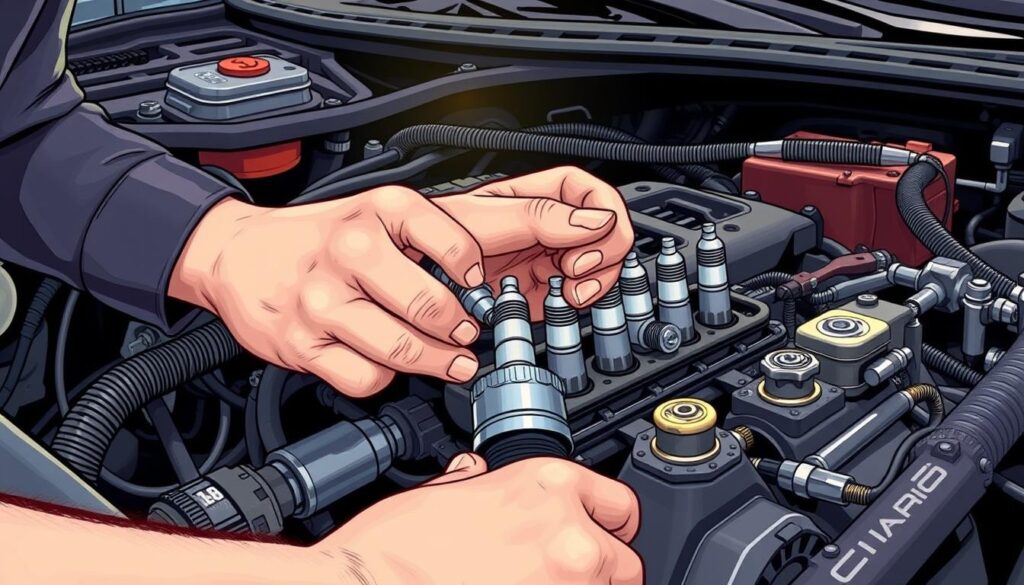
2. Faulty Ignition Coils
Another possible cause of an engine misfire is a bad or malfunctioning ignition coil. Ignition coils convert the low-voltage output of a car’s battery into the high-voltage punch that fires your engine’s spark plugs.
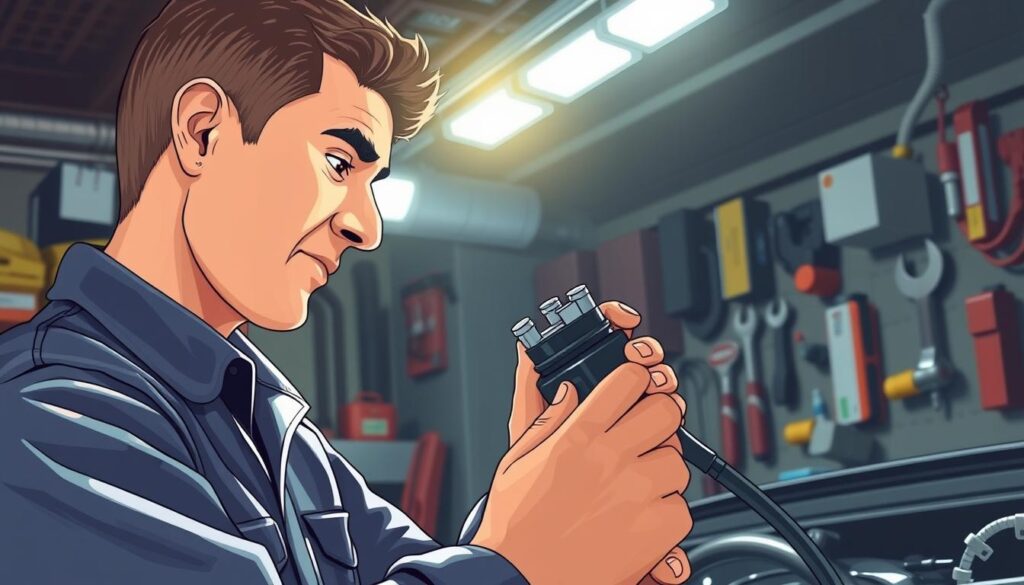
3. Clogged or Malfunctioning Fuel Injectors
A clogged or malfunctioning fuel injector can cause a misfire if it fails to deliver the proper fuel to one of your engine’s cylinders. This can lead to an imbalanced air-fuel mixture, resulting in misfires.
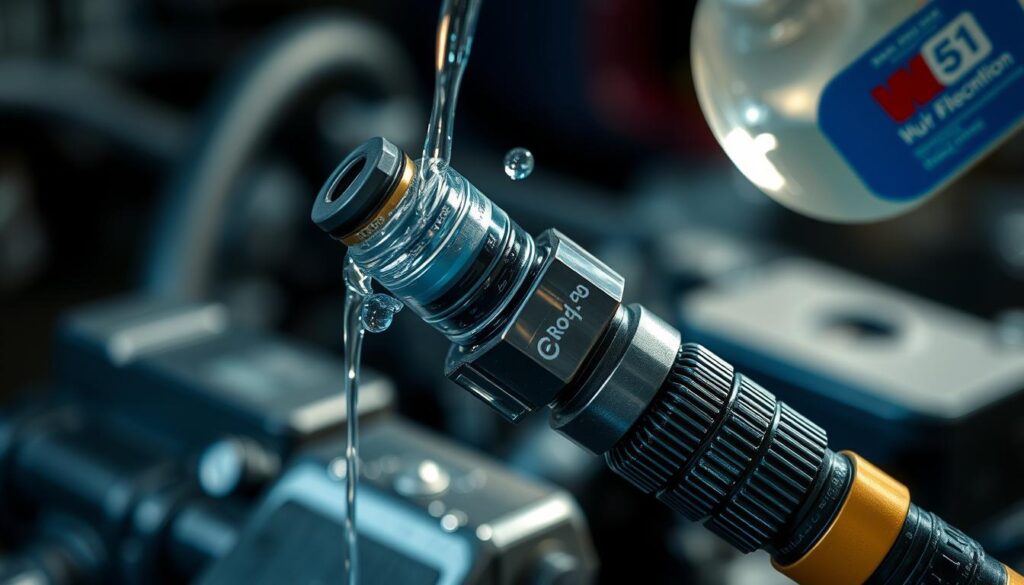
4. Vacuum Leaks
A vacuum leak in the intake manifold gasket or a vacuum hose can also cause an engine misfire. This kind of leak causes what’s known as a lean misfire, a situation in which there’s too much air and too little fuel in your car’s air-fuel mixture.
5. Intake Manifold Gasket Issues
Intake manifold gasket issues create similar problems to vacuum leaks, allowing air to enter the system at unintended points and disrupting the carefully calibrated air-fuel ratio.
6. Defective Mass Airflow Sensor
The mass airflow sensor (MAF) measures the air entering the engine. Your car’s Electronic Control Unit, or ECU, uses the info to optimize the engine’s air-fuel mix. A dirty or faulty MAF causes a mix that’s either too rich or too lean, and that causes a misfire.
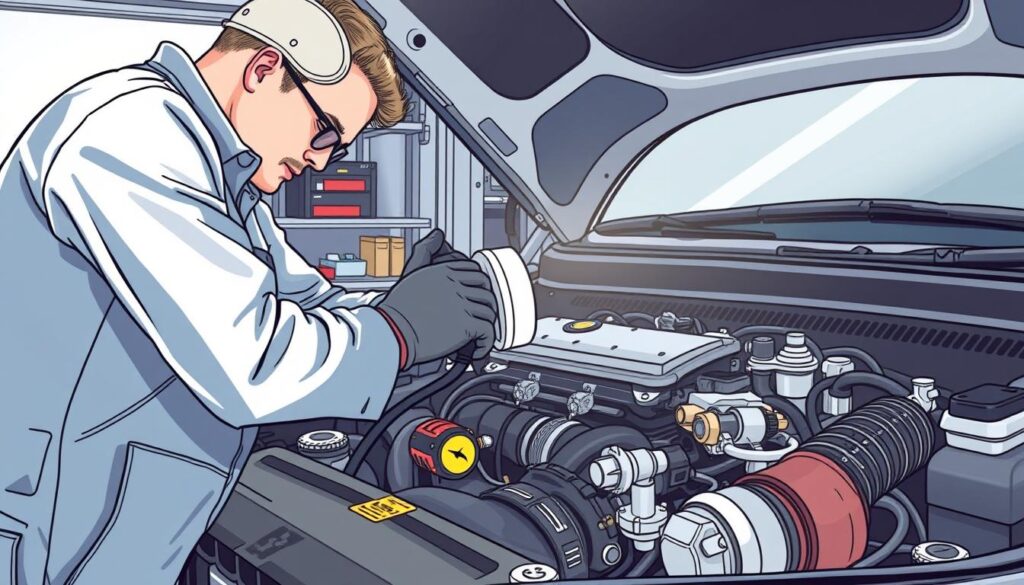
7. Low Fuel Pressure
Low fuel pressure could be the reason for a faulty fuel pressure regulator, a defective fuel pump, or a clogged fuel filter. Low fuel pressure can lead to a thin mixture in your engine which can lead to misfiring on all cylinders.
8. Incorrect Air-Fuel Mixture
Incorrect air-fuel mixture from various sensor failures (oxygen sensors, coolant temperature sensors) confuses the engine management system and leads to misfiring.
9. Low Engine Compression
Low engine compression due to worn piston rings, damaged valves, or a blown head gasket prevents proper combustion, causing persistent misfires that can’t be fixed by replacing ignition components.
10. Timing Belt or Chain Problems
Timing belt or chain problems disrupt the precise synchronization between the crankshaft and camshaft, causing valves to open at the wrong time and resulting in misfires that can cause serious engine damage if not addressed.
DIY Diagnosis: How to Identify the Cause
To tackle engine misfires, you’ll need to use a combination of modern technology and old-fashioned detective work. Modern vehicles come equipped with advanced monitoring systems that can detect issues and alert you through the check engine light.
Using OBD-II Scanners
An OBD-II scanner is a valuable tool for diagnosing engine misfires. It can retrieve trouble codes that pinpoint which cylinder is misfiring and often provide clues about the underlying cause. Understanding how to interpret misfire codes (typically P0300 for random misfires or P0301-P0308 for specific cylinders) is crucial for accurate diagnosis.
Visual Inspection Tips
A visual inspection of spark plugs can reveal valuable information. Oil-fouled plugs suggest an internal engine issue, while carbon-fouled plugs indicate a rich fuel mixture. Testing ignition coils with a multimeter or swap-testing between cylinders can help identify faulty components without expensive equipment.
For those needing professional assistance with diagnosis, our WhatsApp service (+44-7822010953) provides direct access to expert advice. You can also perform a compression test to check for mechanical issues or simple fuel pressure tests to determine if the fuel system is delivering adequate pressure to the injectors.
When to Seek Professional Help
If you’re experiencing persistent engine misfires, it’s crucial to know when to seek help from a qualified mechanic. While many misfire causes can be diagnosed at home, certain complex issues require professional diagnostic equipment and expertise.
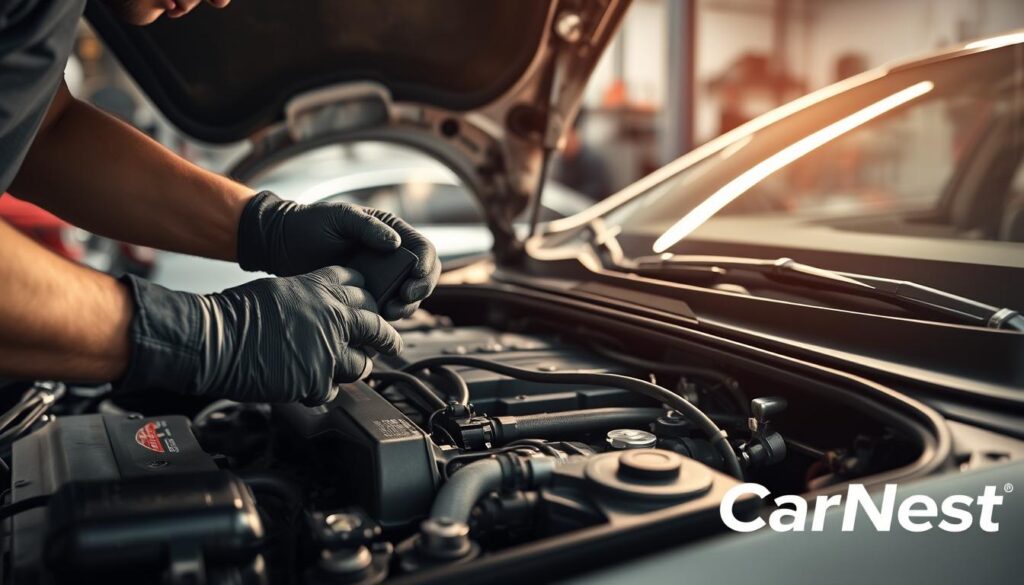
Complex Misfire Issues
Internal engine problems, such as low compression, timing chain issues, or valve problems, typically require a professional mechanic with specialized tools. When multiple systems are potentially causing misfires, a systematic approach from a qualified technician can save time and prevent incorrect parts replacement.
Finding a Qualified Mechanic
To find a qualified mechanic, look for someone who specializes in engine performance issues and has experience with your specific vehicle make. For immediate assistance with complex misfire issues, you can contact us via WhatsApp at +44-7822010953 to discuss your car’s symptoms. Effective communication with your mechanic about the misfire symptoms you’re experiencing is key to aiding in their diagnosis.
“The cost of professional diagnosis is often worth the investment to avoid the ‘parts-changing’ approach that can waste money on unnecessary components.” Specialized computer diagnostics can identify intermittent misfires that might not be apparent during a short test drive, ensuring a more accurate diagnosis and repair.
Preventing Future Engine Misfires
The best way to avoid engine misfires is through proactive car care. By following a few simple steps, you can significantly reduce the likelihood of misfires and keep your engine running smoothly.
Regular Maintenance Schedule
Following the manufacturer’s recommended maintenance schedule is crucial. Regular replacement of wear items like spark plugs and ignition coils at recommended intervals can prevent misfires caused by deteriorating components. For personalized maintenance advice specific to your vehicle, you can contact our experts via WhatsApp at +44-7822010953.
Quality Fuel and Parts
Using high-quality fuel from reputable stations helps prevent fuel system issues that can lead to misfires. When replacing components, choosing OEM or high-quality aftermarket parts rather than the cheapest option provides better reliability and longevity. Regular fuel system cleaning services can also prevent injector clogging and maintain proper fuel delivery to all cylinders.
| Maintenance Task | Frequency | Benefit |
|---|---|---|
| Spark Plug Replacement | As recommended by manufacturer | Prevents misfires due to worn plugs |
| Fuel System Cleaning | Every 15,000 miles | Maintains proper fuel delivery |
| Ignition Coil Replacement | As recommended by manufacturer | Prevents misfires due to faulty coils |
As the saying goes, “An ounce of prevention is worth a pound of cure.” Regular maintenance and the use of quality parts can save you from the hassle and expense of dealing with engine misfires. By being proactive, you can ensure your engine runs efficiently and effectively for years to come.
“Regular maintenance is key to preventing engine misfires and ensuring your vehicle runs smoothly.”
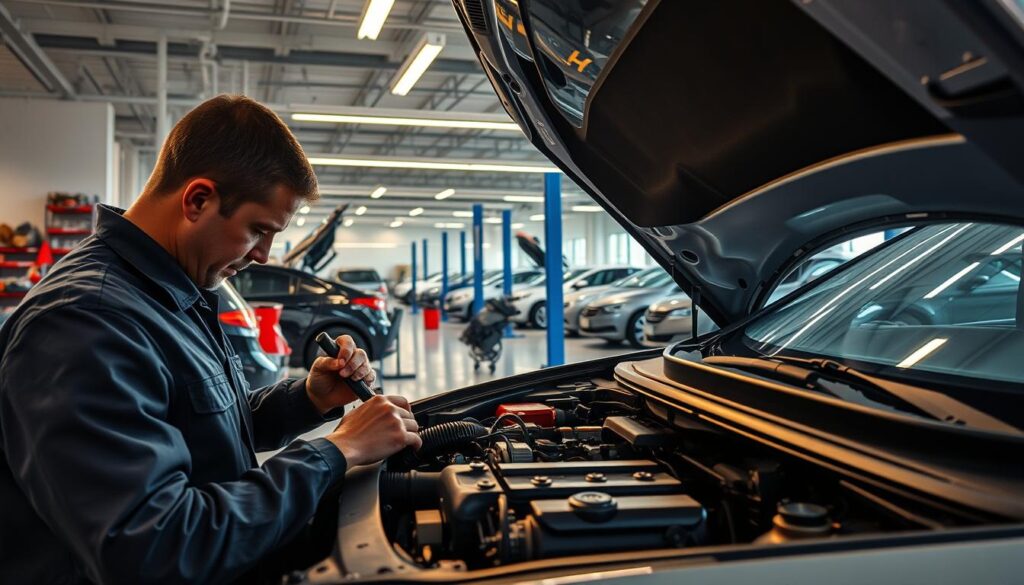
Conclusion
Now that we’ve covered the top 10 reasons for engine misfires, it’s time to take a closer look at how to prevent them. We’ve explored common issues like spark plugs and ignition coils, as well as more complex problems involving compression and timing. Understanding the symptoms of engine misfires helps you identify problems early, potentially saving you from expensive repairs.
By being proactive and maintaining a regular maintenance schedule, using quality fuel and parts, you can prevent many misfire causes. For complex issues, seeking professional help is advisable to prevent further damage. Remember, a check engine light, especially when flashing, should never be ignored as it often indicates an active misfire.
For personalized assistance with your specific engine misfire issues, don’t hesitate to contact our expert team via WhatsApp at +44-7822010953. Taking a proactive approach to your vehicle’s health will ensure a smoother, more reliable driving experience and extend the life of your engine.
